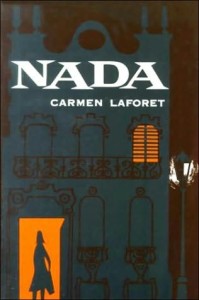by Carmen Laforet
Spain. 272 pages. 1945.
 Carmen Laforet’s Nada ranks among the most important literary works of post-Civil War Spain. Loosely based on the author’s own life, it is the story of an orphaned young woman who leaves her small town to attend university in war-ravaged Barcelona.
Carmen Laforet’s Nada ranks among the most important literary works of post-Civil War Spain. Loosely based on the author’s own life, it is the story of an orphaned young woman who leaves her small town to attend university in war-ravaged Barcelona.
Residing amid genteel poverty in a mysterious house on Calle de Aribau, young Andrea falls in with a wealthy band of schoolmates who provide a rich counterpoint to the squalor of her home life. As experience overtakes innocence, Andrea gradually learns the disquieting truth about the people she shares her life with: her overbearing and superstitious aunt Angustias; her nihilistic yet artistically gifted uncle Román and his violent brother Juan; and Juan’s disturbingly beautiful wife, Gloria, who secretly supports the clan with her gambling. From existential crisis to a growing maturity and resolve, Andrea’s passionate inner journey leaves her wiser, stronger, and filled with hope for the future.
About the author
 Laforet was born in Barcelona, Spain, but at the age of two she moved with her family to the Canary Islands where she spent her childhood. At age 12 she suffered the loss of her mother, and her father subsequently married a woman disliked by Laforet and her siblings (unsavory experiences portrayed in much of her literature). In 1939 at the age of 18, Laforet left for Barcelona where she studied Philosophy at the University of Barcelona while living with relatives. In 1942 she departed for Madrid where she studied Law at the Universidad Complutense. During her second year, she withdrew from classes to devote herself completely to writing, and between January and September 1944 she penned her first novel, Nada, which earned Editorial Destino’s Nadal Prize in its first year of publication (1945). A novel of female adolescent development, Nada is considered a classic in 20th century Spanish literature; in many respects, this novel is Spain’s The Catcher in the Rye with regard to such universal themes as existentialism and the adolescent search for identity.
Laforet was born in Barcelona, Spain, but at the age of two she moved with her family to the Canary Islands where she spent her childhood. At age 12 she suffered the loss of her mother, and her father subsequently married a woman disliked by Laforet and her siblings (unsavory experiences portrayed in much of her literature). In 1939 at the age of 18, Laforet left for Barcelona where she studied Philosophy at the University of Barcelona while living with relatives. In 1942 she departed for Madrid where she studied Law at the Universidad Complutense. During her second year, she withdrew from classes to devote herself completely to writing, and between January and September 1944 she penned her first novel, Nada, which earned Editorial Destino’s Nadal Prize in its first year of publication (1945). A novel of female adolescent development, Nada is considered a classic in 20th century Spanish literature; in many respects, this novel is Spain’s The Catcher in the Rye with regard to such universal themes as existentialism and the adolescent search for identity.
Laforet published a total of five novels—including her posthumous Al volver la esquina, published in May 2004 and considered by many to be her most accomplished psychological novel—as well as short stories, novellas, and letters. Since Laforet’s death on February 28, 2004, renewed critical attention has focused on her lesser known, post-Nada works. — Wikipedia.com
Order this book
When you order this book on Amazon.com or Amazon.de, a percentage of the price is goes right back into site maintenance and development! Go ahead—buy your books and support TheBookerTea.com.